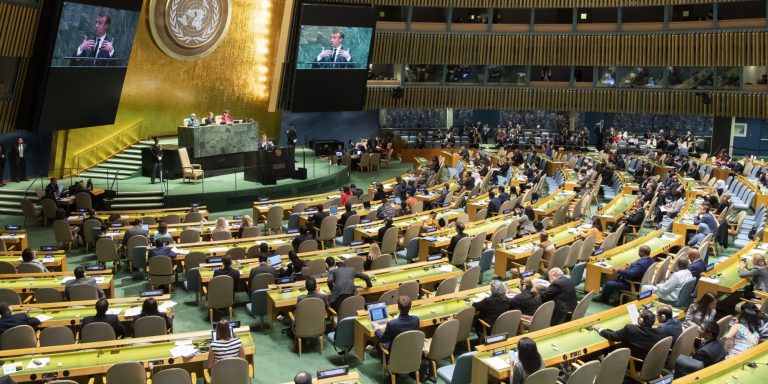INTELBRIEF
September 25, 2019
IntelBrief: Climate Change, Iran, Dominate Headlines at 2019 UN General Assembly

- At the 2019 United Nations General Assembly (UNGA), which kicked off this week, topics including Iran’s attack on Saudi Arabia and global climate change are dominating the headlines.
- A recent report concluded that without a significant effort to reduce carbon emissions, the next two decades will bring catastrophic climate scenarios that include droughts, flooding, and widespread food insecurity.
- Another hot button issue at UNGA includes ongoing instability in Venezuela, where over one million refugees have fled the country amidst a growing humanitarian crisis.
- In remarks on Tuesday, President Trump left the door open for diplomacy, noting that the United States has no ‘permanent enemies’ and countries that are today close allies were once bitter enemies of Washington.
.
Events at the 74th Session of the United Nations General Assembly (UNGA) opened with a major summit on climate change. Swedish teenager and climate activist Greta Thunberg admonished world leaders for failing to do enough, proclaiming ‘We are at the beginning of a mass extinction and all you can talk about is money…How dare you.” Just last week, millions of young activists from around the world staged a series of demonstrations to protest what they see as continued inaction by governments on the issue of climate change. At the Climate Action Summit, UN Secretary General Antonio Guterres is planning for several dozen countries to move forward with plans to reduce carbon emissions and put together a detailed strategy to help the world’s most vulnerable populations deal with climate change.
Guterres declared that 77 countries have committed to carbon neutrality by 2050, although these nations combined account for less than half of global carbon dioxide emissions. Tangible progress on the issue remains elusive, however, as some of the world’s leading industrialized countries, including the United States, India, Russia, Brazil, and China, remain focused on economics and energy over the environment. A recent report by a UN-backed scientific panel concluded that without a significant effort to reduce carbon emissions, the next two decades will bring catastrophic climate scenarios that include droughts, flooding, and widespread food insecurity.
Another hot button issue at UNGA includes ongoing instability in Venezuela under the oppressive regime of Nicolas Maduro, who has destroyed that country’s economy while creating a humanitarian disaster, leading over one million refugees to flee the country. Overshadowing the event are the recent allegations that U.S. President Trump sought to withhold nearly $400 million in aid to Ukraine until the government in Kiev investigated one of his potential rivals in the 2020 election, former Vice President Joseph Biden. Meanwhile, President Trump dedicated his energy at UNGA to announcing a slate of new initiatives related to a call to protect religious freedoms. The administration highlighted several countries where people are persecuted because they are religious minorities, including China, Pakistan, Egypt, Saudi Arabia, Venezuela, Iran and India. On Tuesday, President Trump delivered a speech that heavily emphasized nationalism and sovereignty, proclaiming that 'the future does not belong to globalists.’
Another major topic at UNGA is the recent Iranian attacks on Saudi Arabia’s oil infrastructure. On Monday, France, the United Kingdom, Germany, and several other Europeans nations joined the United States in blaming Iran for the attacks in Saudi Arabia and insisted that Tehran needs to behave as a responsible stakeholder in the region if the nuclear deal is ever to be salvaged. For its part, Iran has continued to deny responsibility for the attack, even in the face of mounting evidence, and continued aggressive actions in the Middle East. Such actions risk alienating the Europeans, who have proven to be Iran’s lifeline and any hope for economic relief in the face of crushing sanctions. British Prime Minister Boris Johnson recently called for Iran to negotiate a new deal, siding with the Trump administration in what could mark a new approach by Europe. Still, President Trump did leave the door open for diplomacy, noting that the United States has no ‘permanent enemies’ and countries that are today close allies of Washington were once bitter enemies.
.
For tailored research and analysis, please contact: info@thesoufancenter.org